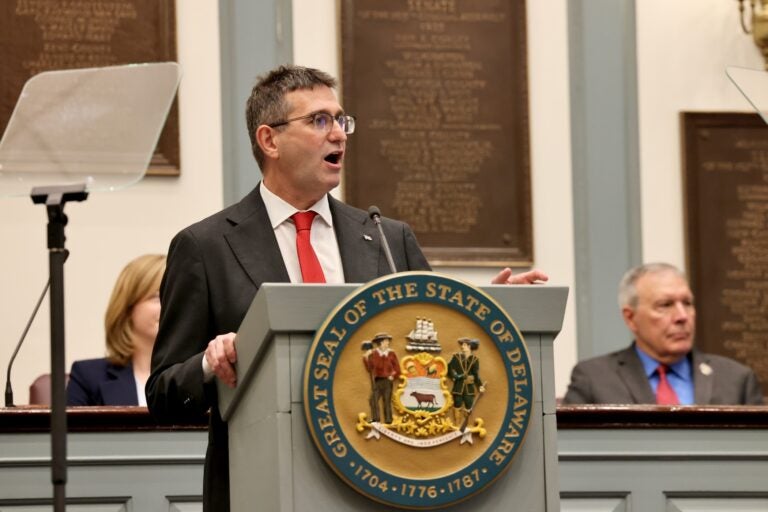Delaware Gov. Matt Meyer vetoes wage theft bill, arguing potential unintended consequences
Meyer said Delaware already has existing laws to fight wage theft and hold bad actors responsible for their actions.

Delaware Gov. Matt Meyer delivers his first State of the State address, April 10, 2025. (Emma Lee/WHYY)
What are journalists missing from the state of Delaware? What would you most like WHYY News to cover? Let us know.
Delaware Gov. Matt Meyer has vetoed legislation designed to combat wage theft in the construction industry.
The bill, sponsored by state Sen. Jack Walsh, D-Pike Creek, and state Rep. Ed Osienski, D-Newark, aimed to eliminate loopholes that allow a general contractor to misclassify an employee as an independent contractor, potentially making them ineligible for benefits such as overtime pay, unemployment insurance and workers’ compensation.
The legislation would have also made a general contractor liable for a subcontractor’s compliance with state law. Currently, the Department of Labor can’t penalize businesses who don’t register as subcontractors. It also allowed the Department of Labor to deny, suspend or revoke the certificate of registration of a contractor who hires unregistered subcontractors.
Walsh said that the general contractor, who oversees the day-to-day activities on a construction project, is already responsible for everything that happens during a project, including subcontractors. This, he said, just adds more teeth in the law.
“They’re the owner’s [representative] on a project,” Walsh said. “And then when it comes to protecting their workers, they want to wash their hands of it and it’s just not right. Workers are getting exploited and it needs to start somewhere.”
In his Thursday veto message, Meyer said he supported addressing wage theft, but had concerns about making the contractor liable for bad actors.
“We have an obligation to enforce existing law and regulations regarding wage theft,” Meyer’s message said. “We have the tools to do so without imposing additional burdens on businesses.”
Walsh and Osienski said they are asking state lawmakers to override Meyer’s veto. In response to his veto message, they accused the governor of standing in “blatant opposition to local laborers.”
“By vetoing this bill, the governor has chosen to side with powerful contractor lobbies instead of the thousands of honest workers — many of them immigrants and people of color — who are cheated out of fair pay and basic protections every day,” they said in a joint news release. “Vetoing it sends a dangerous message — that Delaware will continue to tolerate loopholes that allow bad actors to exploit workers, skirt taxes, and undermine law-abiding contractors who do things the right way.”
Meyer countered that argument while speaking with reporters the next day, saying his veto was protecting small, new and minority-owned businesses.
“If undermining small minority contractors is a priority for you, then go ahead and override the veto,” he said. “If the statement is we’re not doing a good job enforcing it against subcontractors, so now we’d have to enforce it against subcontractors and contractors, that doesn’t make sense to us.”
Supporters and opponents
The legislation faced considerable pushback from business leaders and industry trade groups because of the liability issue, such as Associated Builders and Contractors of Delaware, the Delaware Hispanic Commission, Habitat for Humanity, Homebuilders Association of Delaware and the New Castle County Chamber of Commerce.
At least one group that represents minority communities, the Delaware Hispanic Commission, wrote to the governor earlier this year in opposition of the bill.
“Many Hispanic and Latino individuals, especially those in construction and landscaping – operate as independent contractors out of necessity,” the letter said. “This bill could significantly limit their opportunities by discouraging general contractors from working with them due to the risk of joint liability.”
The commission also expressed concern that pushing for more subcontractors to register with the state would create a database of undocumented workers that could be misused.
The Eastern Atlantic States Regional Council of Carpenters, however, was in support of the bill, saying in a letter to Meyer that joint and several liability is a sensible policy and has already been implemented by New Jersey and Washington, D.C.
“While corporate lobbyists for construction business owner organizations claim contractors are helpless bystanders to the actions of subcontractors, the truth is that general contractors utilizing unscrupulous subcontractors are beneficiaries of a system that incentivizes plausible deniability,” the group said.
Meyer’s veto message said that the state’s Department of Labor needed more resources to enforce existing laws.
“To meaningfully protect workers, we must consider increased funding and staffing to enable the DOL to carry out its enforcement responsibilities effectively,” he wrote. “Additionally, I intend to explore alternative legislative, policy, educational, and enforcement avenues.”
Meyer said he was asking Labor Department officials to create recommendations to address wage theft by the end of the year.
This story was supported by a statehouse coverage grant from the Corporation for Public Broadcasting.

Get daily updates from WHYY News!
WHYY is your source for fact-based, in-depth journalism and information. As a nonprofit organization, we rely on financial support from readers like you. Please give today.







